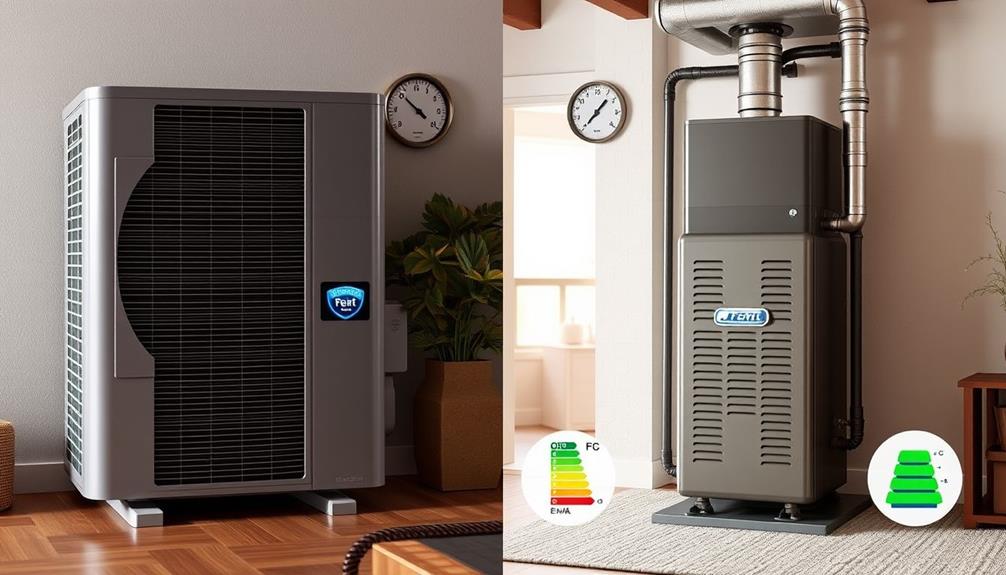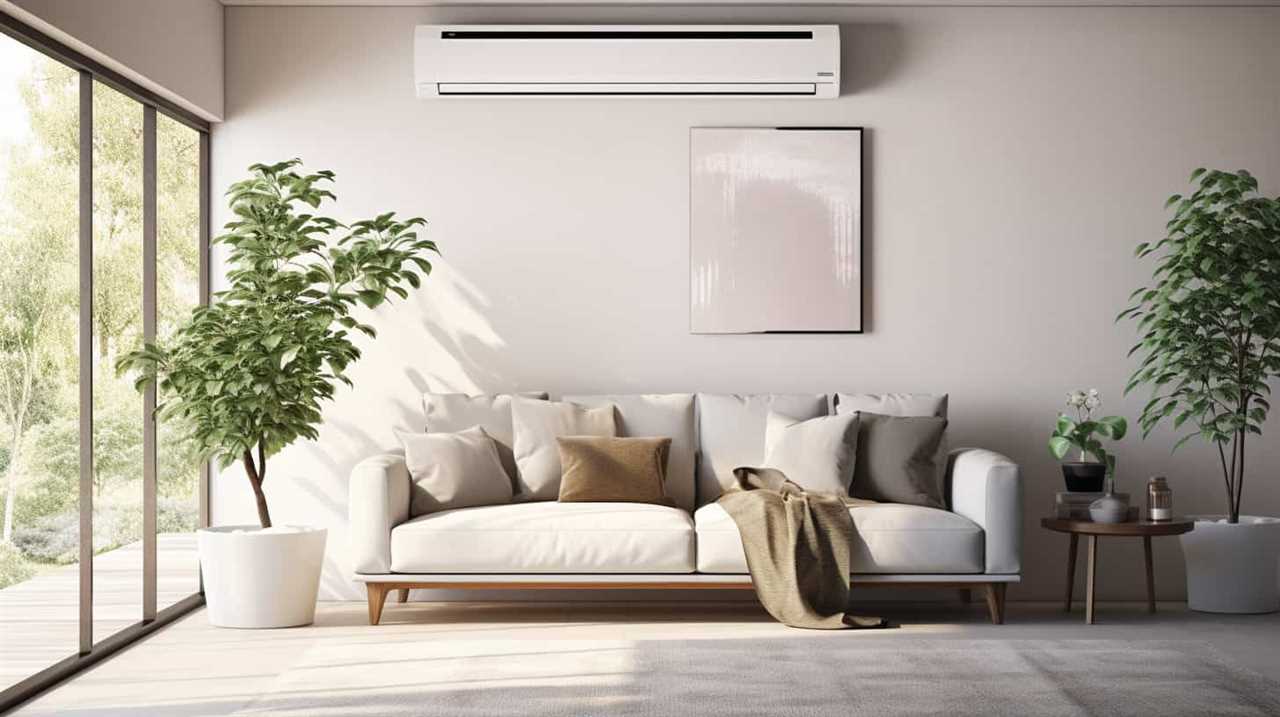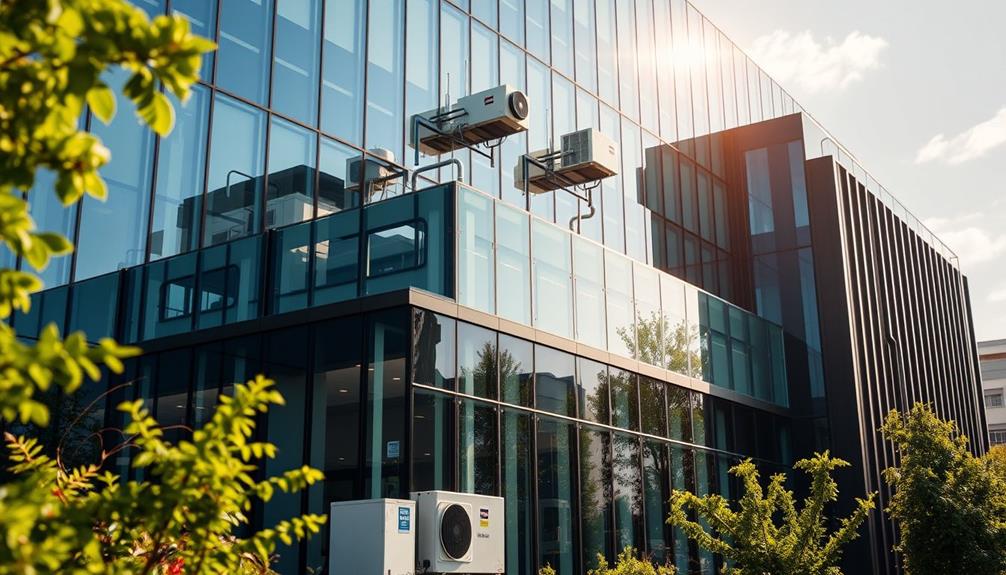When comparing heat pumps and traditional heating systems, you'll find that each has its advantages. Heat pumps are highly efficient, especially in mild climates, and reduce energy consumption, resulting in lower bills. However, in colder regions, gas furnaces might perform better, achieving up to 98.5% efficiency. Maintenance and safety also vary; heat pumps are generally safer with fewer fire hazards but require specific upkeep. Installation costs differ too, with heat pumps often leading to long-term savings despite higher upfront prices. If you explore further, you'll uncover more essential details to help you make the best choice for your home.
Key Takeaways
- Heat pumps are more energy-efficient than gas furnaces, often exceeding 300% efficiency, particularly in mild climates.
- Gas furnaces are better suited for colder regions, achieving up to 98.5% AFUE efficiency but may incur higher operating costs.
- Installation costs for heat pumps range from $4,500 to $20,000, while gas furnaces can cost between $2,500 and $10,000.
- Safety risks with gas furnaces include carbon monoxide poisoning, whereas electric heat pumps pose fewer safety hazards.
- Regular maintenance is essential for both systems to ensure safety, efficiency, and longevity, impacting overall operating costs.
Location and Climate Factors
When choosing between heat pumps and traditional heating systems, location and climate play vital roles. If you live in a mild climate, like zones 1-3 on the DOE climate map, heat pumps can operate efficiently year-round, making them an economical choice. They transfer heat rather than generate it, which can greatly lower your heating costs compared to traditional heating methods.
In addition, modern heating solutions like small wood stoves can also be an effective option in these climates, providing reliable warmth without excessive fuel consumption.
In contrast, if you're in a colder region where outdoor temperatures frequently drop below freezing, gas furnaces are often preferred. They can achieve impressive efficiencies, up to 98.5% (AFUE), but their performance diminishes in milder conditions.
Electric furnaces, used in moderate climates, can provide supplemental heating when gas isn't available, but they might lead to higher operational costs, especially in areas with elevated electricity rates.
In colder climates, heat pumps may require supplemental heating sources to maintain efficiency when temperatures fall below 30°F.
Therefore, understanding your local climate factors is essential in deciding between heat pumps and traditional heating systems to guarantee you choose the most effective and cost-efficient option for your home.
System Operation and Design
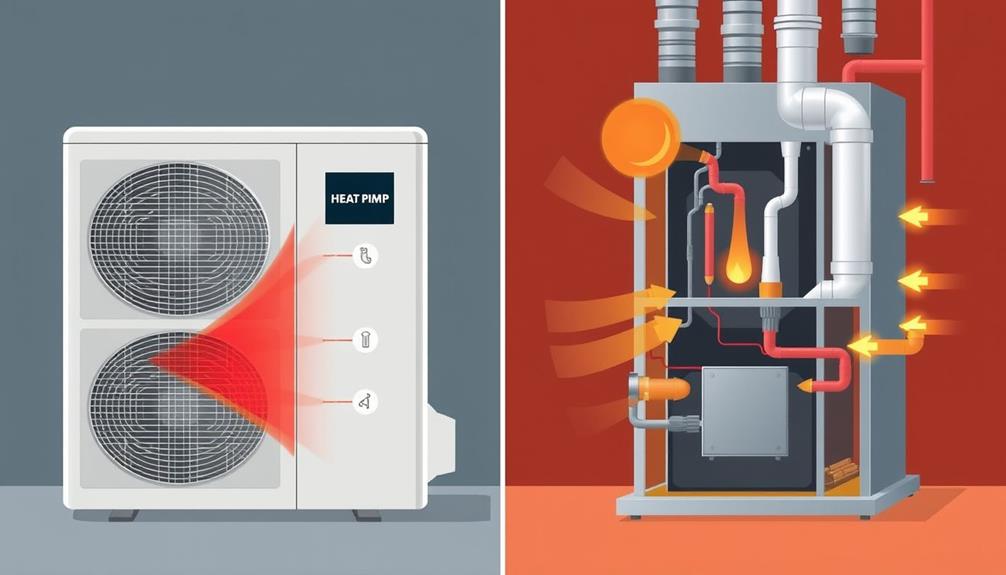
Here are some key features to take into account:
- Space Efficiency: Heat pumps require only 24 inches of clearance for installation, compared to 30 inches needed for furnaces. This compact design allows for more flexible placement within your home.
- Dual Fuel System: Combining heat pumps with traditional furnaces maximizes energy efficiency by using the heat pump when it's mild and switching to the furnace during extreme cold. This strategy can help mitigate heat pump failures caused by extreme weather conditions.
- Indoor Air Management: Unlike traditional systems that need separate air conditioning units, heat pumps provide both heating and cooling, managing indoor air year-round.
- Installation Costs: While initial costs may vary, heat pumps often lead to lower energy bills due to their efficiency.
Consulting with an HVAC professional can help you determine which system operates efficiently for your specific needs.
Understanding how these systems function is essential to making an informed choice for your home heating.
Energy Efficiency Comparison
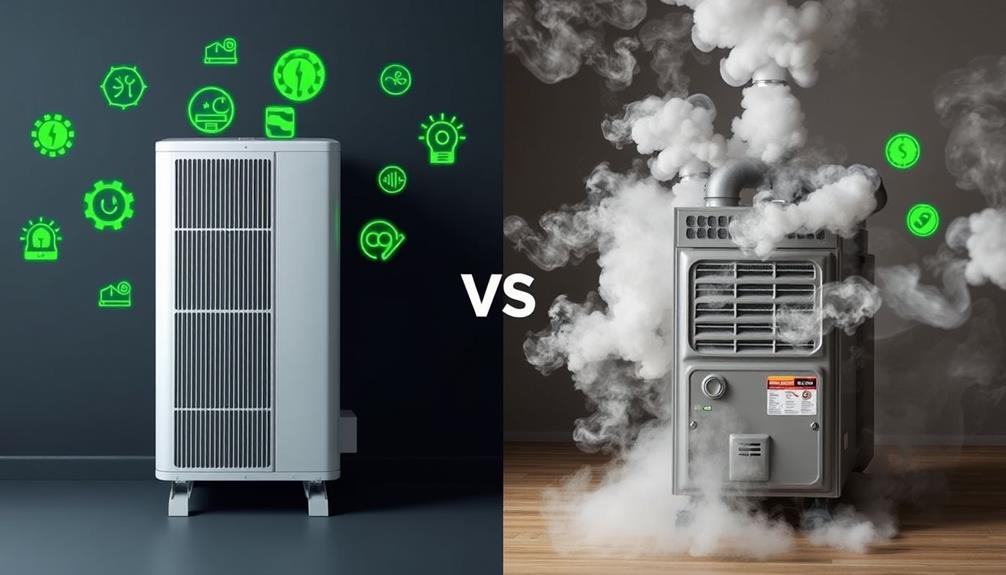
Evaluating energy efficiency is essential when deciding between heat pumps and traditional heating systems. Heat pumps provide impressive energy efficiency, often exceeding 300%. They transfer three times more energy than they consume, making them highly efficient in moderate climates. In contrast, high-efficiency gas furnaces can achieve up to 98.5% Annual Fuel Utilization Efficiency (AFUE), which is good, but they still fall short of heat pump performance in many scenarios.
Here's a quick comparison to illustrate the differences:
| System Type | Energy Efficiency | Operating Costs |
|---|---|---|
| Heat Pumps | >300% | Lower long-term costs |
| Traditional Gas Furnaces | Up to 98.5% AFUE | Higher long-term costs |
In warmer areas, heat pumps lead to lower energy consumption, resulting in reduced energy bills and a smaller carbon footprint. However, keep in mind that their efficiency dips in colder temperatures, often requiring supplemental heating. Despite this, long-term operating costs for heat pumps generally remain lower than those of traditional heating systems, especially in regions with efficient electricity rates.
Safety and Maintenance Issues
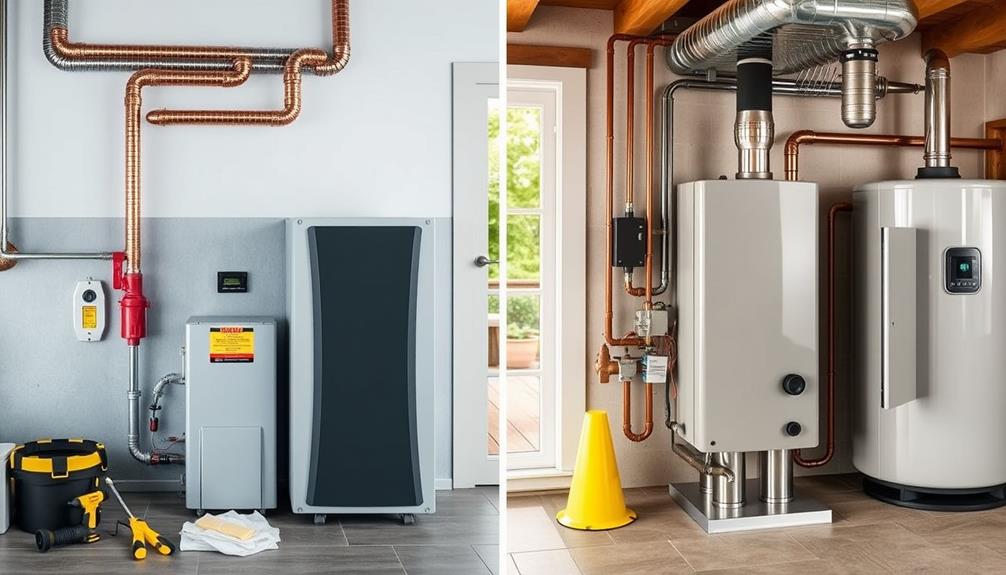
When it comes to safety, gas furnaces pose higher risks like explosions and carbon monoxide poisoning, while electric heat pumps eliminate combustion-related hazards.
Regular inspections can prevent leaks and guarantee both systems operate safely, much like how maintenance extends the lifespan of the toilet.
Regular maintenance is essential for both systems to guarantee they operate safely and efficiently.
Risk Factors Comparison
Taking into account safety and maintenance, heat pumps and traditional gas furnaces present distinct risk factors that homeowners should evaluate.
Gas furnaces come with notable safety risks, such as the potential for explosions and carbon monoxide poisoning. To mitigate these dangers, features like shut-off valves are vital.
On the other hand, electric heat pumps reduce combustion risks, greatly lowering the likelihood of fire hazards and carbon monoxide exposure. They also incorporate leak detection systems for added safety.
Additionally, employing regular maintenance practices is essential for both systems to avoid safety hazards and guarantee peak performance.
Holistic lifestyle approach can also contribute to overall well-being, which may extend to how one manages their home environment.
Here are some key risk factors to evaluate:
- Gas furnaces: Higher risk of explosions and carbon monoxide poisoning.
- Electric heat pumps: No combustion risks, reducing fire hazards.
- Regular maintenance: Essential for both systems to avoid safety hazards.
- Lifespan differences: Gas furnaces last 15 to 30 years, while heat pumps last 15 to 25 years, affected by maintenance and installation quality.
Both systems require annual inspections and maintenance.
While you can handle simple tasks like air filter replacements, it's best to call professionals for thorough checks and repairs.
Making informed decisions about these risk factors will help guarantee a safer home environment.
Maintenance Requirements Overview
Proper maintenance is vital for guaranteeing the safety and efficiency of both heat pumps and traditional furnaces. Regular inspections and air filter replacements are essential for peak performance.
While heat pumps require specific cleaning schedules for their outdoor and indoor units, traditional furnaces need checks for gas leaks and functioning carbon monoxide detectors to mitigate safety risks. Additionally, using ozone air purifiers can help improve indoor air quality, further enhancing the comfort of your home during heating season.
Electric heat pumps generally present lower safety risks compared to gas furnaces, which can lead to explosion and carbon monoxide poisoning hazards if not properly maintained. Routine maintenance helps extend the lifespan of both systems, with heat pumps usually lasting around 15 years and furnaces potentially lasting longer with adequate care.
As a homeowner, you can perform simple maintenance tasks like cleaning air filters and checking for obstructions. However, for complex issues, professional servicing is recommended to maintain system efficiency and safety.
Cost Analysis and Lifespan
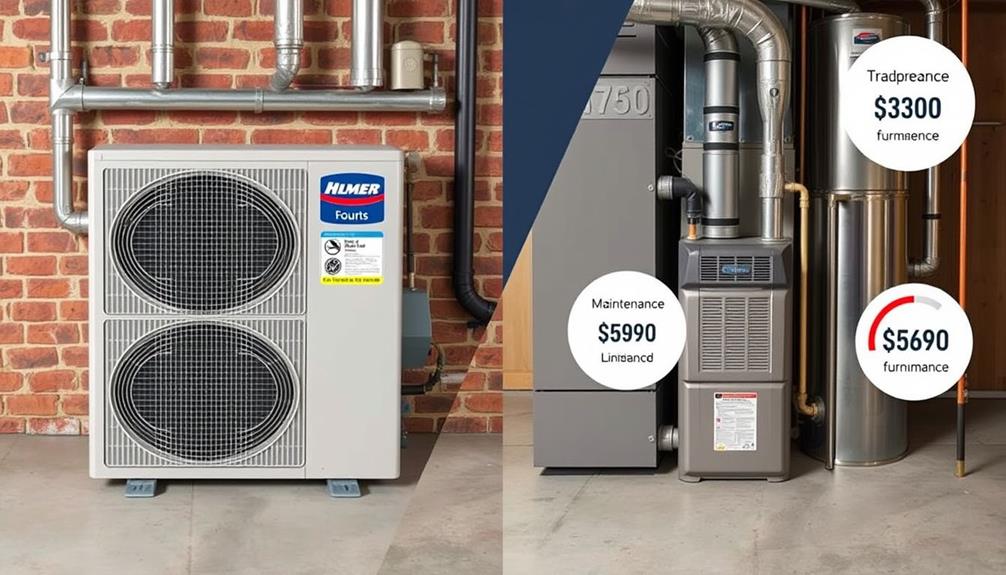
When you consider installation costs, heat pumps usually require a higher upfront investment than traditional gas furnaces.
However, it's crucial to weigh this against their shorter lifespan and potential energy savings.
Additionally, investing in home comfort solutions like garage door openers can further enhance your home's efficiency.
Understanding these factors can help you make a more informed decision about your heating system.
Installation Cost Differences
While evaluating heating options for your home, you'll find significant differences in installation costs between heat pumps and traditional heating systems. The installation cost for heat pumps typically ranges from $4,500 to $20,000, while traditional gas furnaces can reach up to $10,000.
Don't forget that ductwork expenses can add another $3,000 to $7,500. Additionally, just as with the potential for long-term appreciation in gold investments, heat pumps also offer substantial savings over time due to their energy-efficient operation.
Consider these key points:
- Air-source heat pumps generally cost between $4,500 and $8,000, making them a more economical choice.
- Heat pumps offer better energy efficiency, leading to potentially lower operating costs in moderate climates.
- Traditional heating systems, like gas furnaces, can incur higher costs in extreme temperatures.
- Despite the higher initial investment, heat pumps often yield long-term savings on energy bills.
Ultimately, while heat pumps may require a more substantial upfront cost, their energy-efficient operation can translate to lower bills over time.
In contrast, traditional heating systems might seem cheaper to install but can lead to higher ongoing expenses, especially in challenging climates. Your choice should factor in both immediate costs and long-term financial benefits.
Lifespan Comparison
Understanding the lifespan of your heating system is as important as considering installation costs. Heat pumps typically last about 15 to 20 years, while traditional gas furnaces can endure for 20 to 30 years with proper maintenance.
Although gas furnaces may have a longer lifespan, the initial investment for heat pumps ranges from $4,500 to $20,000, considerably higher than the $2,500 to $10,000 for gas furnaces.
However, don't overlook the operating costs. Heat pumps are generally more energy-efficient, especially in moderate climates, leading to considerable long-term savings over time.
Regular maintenance is crucial for both systems; heat pumps need annual servicing, while gas furnaces require yearly inspections to guarantee safety and peak performance.
Ultimately, the cost-effectiveness of each system can vary based on local energy prices and climate conditions. While heat pumps may have a lower operating cost, the higher initial investment could be a concern for some homeowners.
Balancing lifespan, maintenance needs, and energy efficiency will help you make the best choice for your heating needs. Consider both short-term and long-term factors to find the most fitting solution for your home.
Professional Guidance and Recommendations

Managing the complexities of heating options can be challenging, but consulting HVAC professionals simplifies the process. By evaluating your unique heating needs and understanding the advantages of heat pumps versus traditional systems, experts can guide you to make informed choices.
Additionally, understanding the importance of HVAC maintenance can further enhance the efficiency of your heating system. Here are some benefits of seeking professional guidance:
- Tailored recommendations on system selection that fit your specific requirements.
- Insights into installation costs and energy efficiency ratings to help you stay within your budget.
- Access to local Carrier dealers offering the latest high-efficiency technology and potential rebates.
- Comprehensive evaluations of your home to guarantee peak performance and compliance with safety standards.
Engaging HVAC professionals guarantees proper installation, maximizing your heating system's lifespan and efficiency.
Don't forget to obtain multiple quotes from licensed specialists—this way, you can compare competitive pricing and services. By leveraging their expertise, you'll not only navigate the complexities of heating options but also align your choices with your environmental goals and financial plans.
With the right guidance, you can feel confident in your decision, knowing you've chosen the best heating solution for your home.
Frequently Asked Questions
What Is the Downside to a Heat Pump?
One downside to a heat pump is its reduced efficiency in extremely cold temperatures, which can lead to higher energy costs. You'll also face higher installation expenses and ongoing maintenance commitments to keep it running well.
Is It Cheaper to Run a Heat Pump or Electric Heater?
It's generally cheaper to run a heat pump than an electric heater, especially in moderate climates. You'll enjoy lower energy bills and longer-lasting equipment, making your investment more cost-effective over time.
Are Heat Pumps More Efficient Than Traditional Ac?
Think of heat pumps like a well-tuned orchestra—they operate with harmony and efficiency. Yes, heat pumps are more efficient than traditional ACs, often exceeding SEER ratings of 15, which saves you money on energy bills.
Can a Heat Pump Cool a House in 100 Degree Weather?
Yes, a heat pump can cool your house in 100-degree weather. It transfers heat outdoors, maintaining comfort. Just verify your home's insulation and sealing are effective to maximize its cooling efficiency during extreme temperatures.
Conclusion
In the showdown between heat pumps and traditional heating, it's clear each has its strengths. If you're looking for energy efficiency and eco-friendliness, heat pumps might just be your golden ticket. However, traditional systems can't be counted out, especially in colder climates. Ultimately, your choice should reflect your specific needs and circumstances. Remember, when it comes to heating your home, it's not just about warmth; it's about finding the right balance for your comfort and budget.
